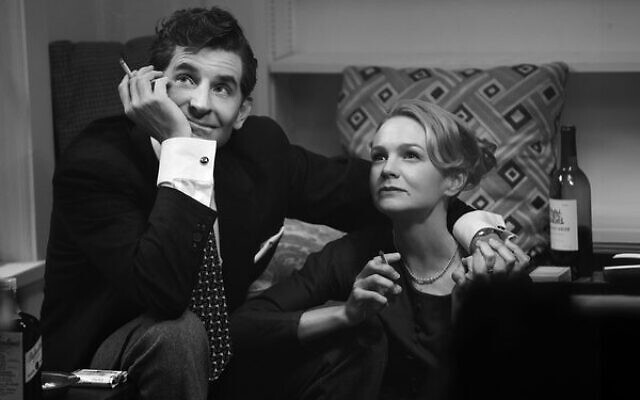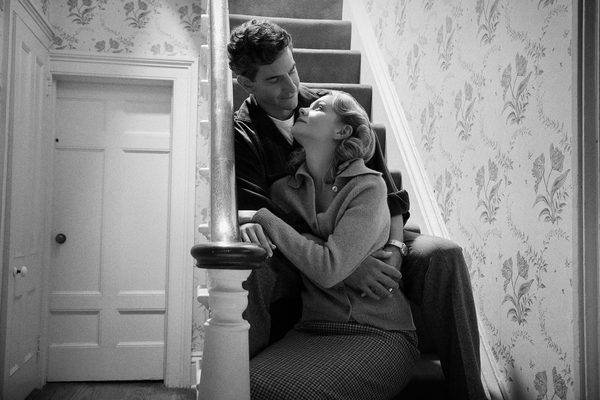Controversy & creativity
Peeling back the curtain on Leonard Bernstein, Maestro unveils a symphony of creativity, controversy and composition. And Bradley Cooper's second foray into directing hasn't been without controversy itself. Jessica Abelsohn explores the film and the surrounding commentary.

As soon as it was announced, Bradley Cooper’s Maestro courted controversy. From a non-Jewish actor playing one of the most influential Jewish musicians through to his prosthetic nose, there have been numerous people speaking up about the film.
Maestro delves into the life of legendary composer and conductor Leonard Bernstein, and his relationship with his wife Felicia Montealegre.
Bernstein was a musical luminary whose story is as complex as the compositions that made him an icon, and the stunning visuals and performances of Cooper as Bernstein and Carey Mulligan as Montealegre in Maestro certainly do his tale justice.
Bernstein was a towering figure in the world of music. He was a conductor, composer, pianist and educator whose influence has spanned not only genres but also generations.

From an early age, Bernstein exhibited a prodigious musical talent. He began piano lessons at the age of 10, and by the time he was a teenager, he was already recognised as a gifted musician. During his time at Harvard, he developed a deep love for classical music but was also drawn to the rich tapestry of jazz and musical theatre.
It was an impromptu debut, substituting as the conductor at a concert with the New York Philharmonic that catapulted him into the spotlight.
Suddenly, Bernstein was on the map, hailed as a brilliant and charismatic conductor. He held his tenure as the orchestra’s musical director for almost a decade, during which he brought a new energy and accessibility to classical music, making it more engaging for audiences.
In the musical theatre world, he was most well known for composing West Side Story alongside fellow Jewish musician Stephen Sondheim. The musical – with its innovative blend of classical, jazz and latin music – became a cultural phenomenon and solidified Bernstein’s place in the pantheon of American composers.
Central to the film is Bernstein’s marriage to Montealegre, which became quite a complex aspect of his personal life. The marriage was marked by its challenges, most notably Bernstein’s bisexuality which he openly acknowledged. Despite societal norms of the time and the challenges associated with such openness, the couple remained committed to each other.

Another challenge that the family faced was the spotlight that was constantly on them. While their three children often found themselves facing the bright lights, it was Montealegre who took on the task of shielding them as much as she could and protecting their privacy.
The public’s reception of Maestro has been as diverse as Bernstein’s musical repertoire.
Some have praised Cooper’s portrayal of the iconic figure, lauding the film for bringing Bernstein’s story to a new generation. Others, however, have raised concerns about the film’s accuracy and the potential impact on Bernstein’s legacy.
One major concern that many people raised was Cooper’s use of a prosthetic nose. Cooper was accused of fuelling antisemitic stereotypes by wearing an exaggerated nose that appears even larger than Bernstein’s was in real life. In an online post, British Jewish star Tracy Ann Oberman said that Cooper should be able to portray the musician using his skills alone.
“If Bradley Cooper green-lights your film to play the Jewish composer Bernstein and you want him over a Jewish A-Lister who can equally play that role – then let Bradley Cooper’s acting be so magnificent and truthful that the character of Bernstein shines through what he already looks like,” she wrote, before continuing, “If Bradley Cooper can’t do it through the power of acting alone, then don’t cast him – get a Jewish actor.”
Comedian and author David Baddiel also commented on Cooper being cast. “I’ve talked about authenticity casting not applying to Jews – and what that means – many times,” he wrote on X. “The only difference here is it’s more – well – on the nose.”
Bernstein’s children, however, weren’t fazed by Cooper being cast or the use of the prosthetic, explaining that the actor and director had consulted them every step of the way, saying, “It happens to be true that Leonard Bernstein had a nice, big nose. Bradley chose to use make-up to amplify his resemblance, and we’re perfectly fine with that. We’re also certain that our dad would have been fine with it as well.”
Despite the controversy around it, the film is beautifully done. What it all came down to for Bernstein, and what is portrayed throughout the film, is that his love of music is, above all else, what motivates him. And this is why his influence has continued to extend far beyond the concert hall.
His legacy is one of innovation, breaking down barriers between musical genres, and fostering a deep appreciation for the power of music to connect people. Bernstein passed away on October 14, 1990, but his music and the spirit of his artistry continue to resonate with audiences around the world, ensuring that his impact endures for generations to come.
Maestro is screening as part of JIFF Encores, from November 30 to December 6.
For more information and tickets, visit jiff.com.au

comments